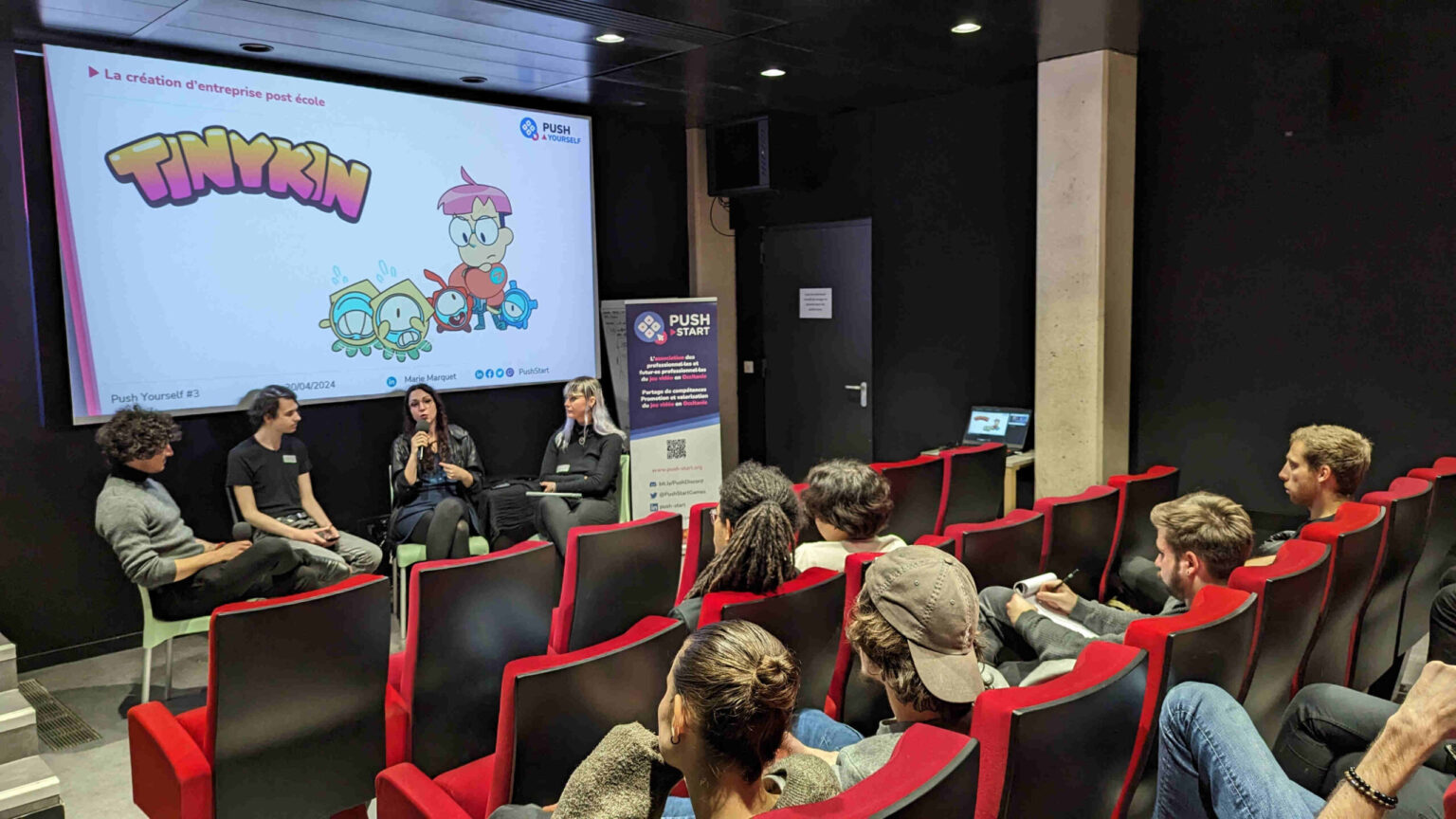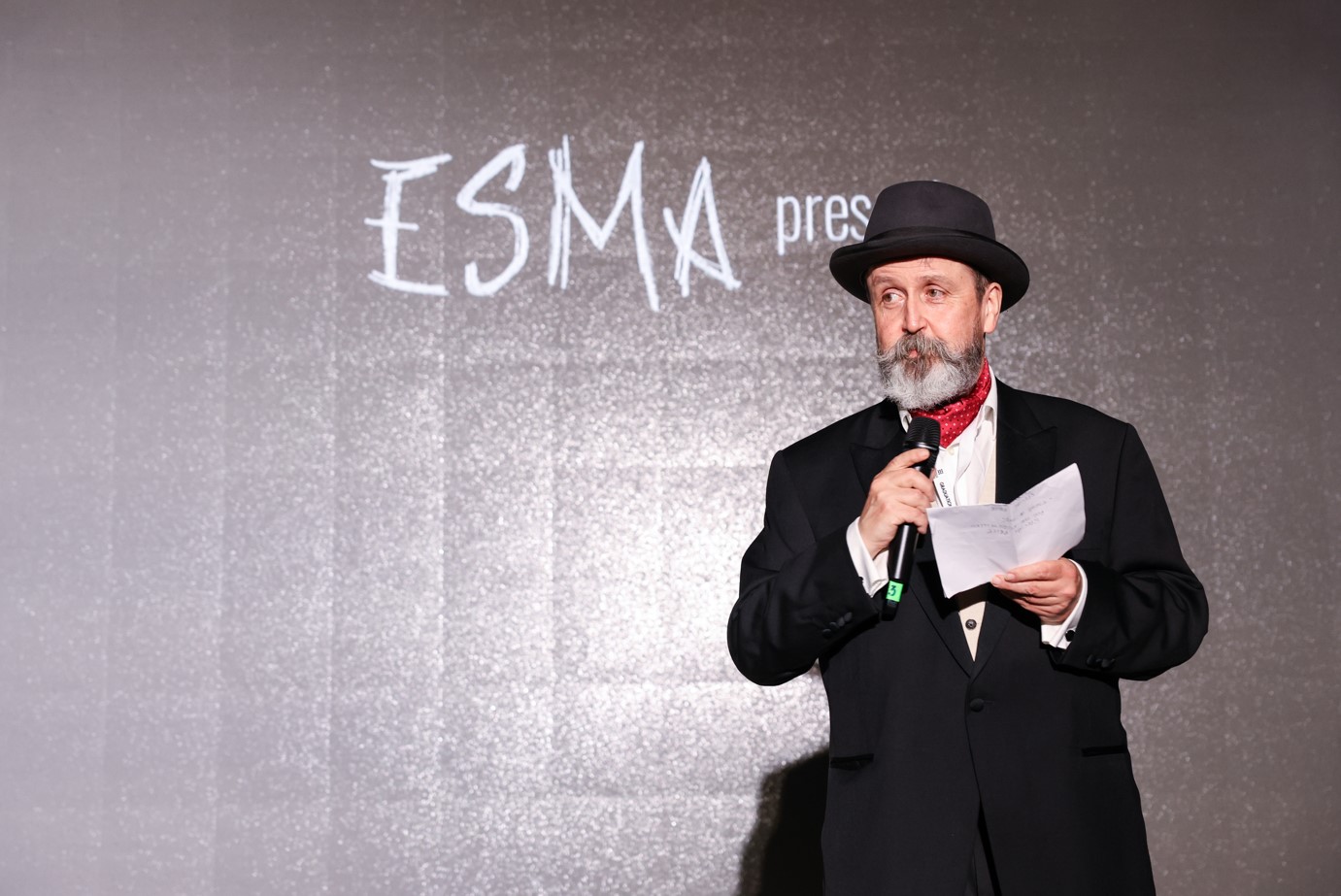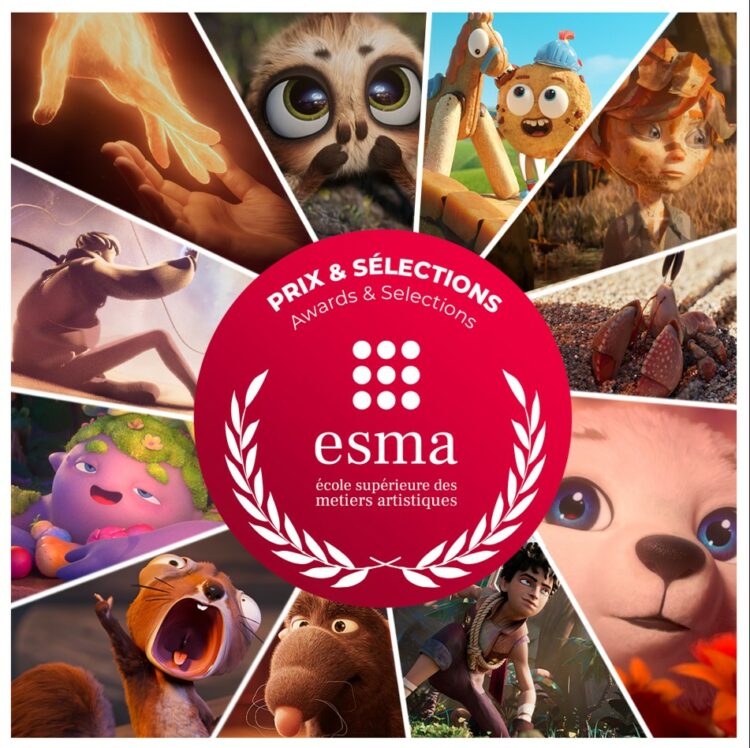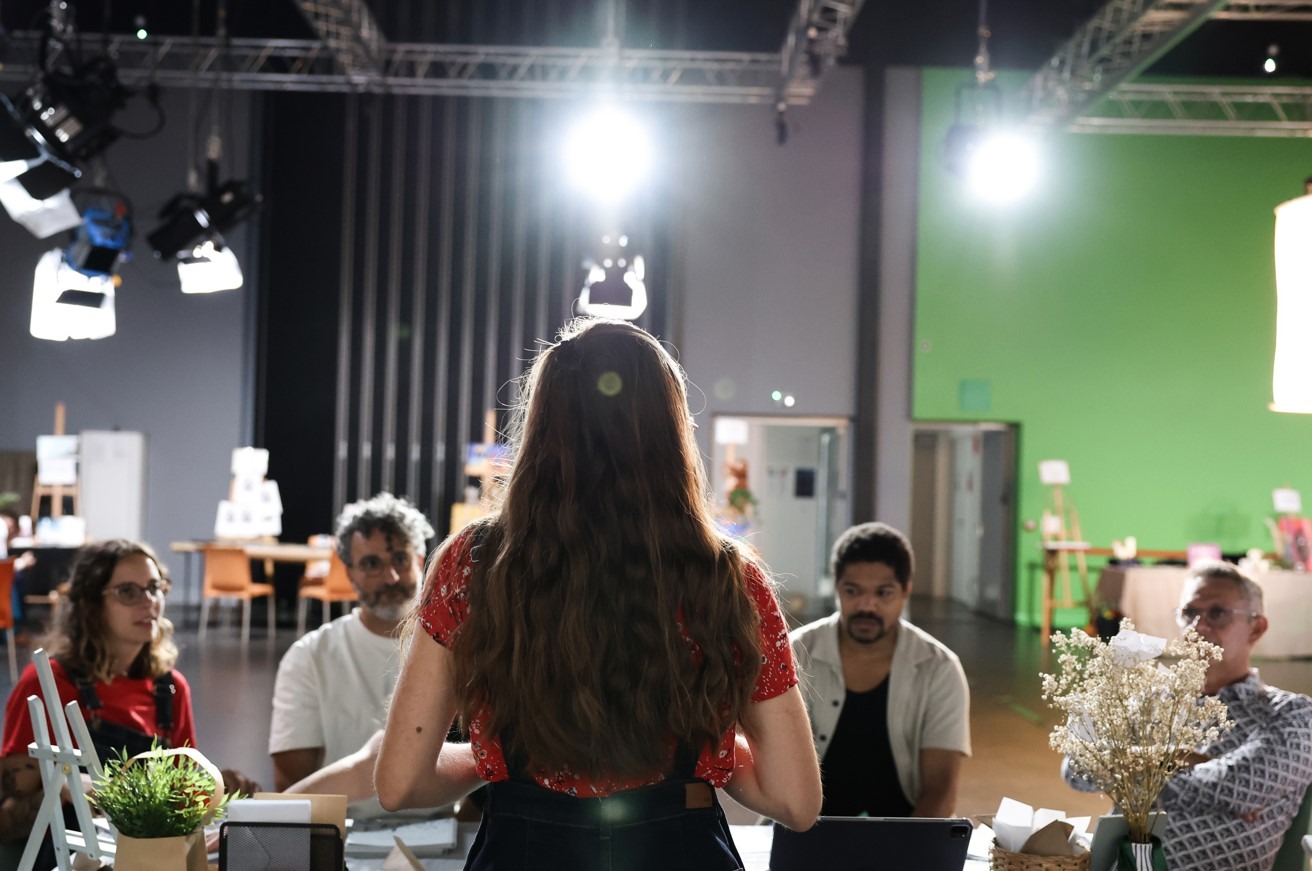
- date 05.27.2024
- type Conférences
- campus Montpellier
- Formation Video Game
As part of our commitment to giving our students a real insight into the professional world, last month ESMA Video Game collaborated with Push Start (a dynamic association dedicated to the development of video game companies in the Occitanie region) to organise an exceptional conference. The topic, "Creating your own production studio", was supported by two young founders.
Inspiring and experienced entrepreneurs
This conference, held as part of Push Yourself, an initiative led by the Push Start Student Board, took place in one of the auditoriums on the Montpellier campus, and featured the participation of two young designers : Maxime Chaize, Co-founder and CEO of the Hot Chili Games studio, and Marie Marquet, Co-founder and Artistic Director of the Splashteam studio. They shared their experiences and the challenges they have faced in founding and developing their own studios.
Marie Marquet captivated the audience with her background and responsibilities as Art Director at Splashteam. She detailed the visual design process, the importance of consistent art direction, and the specific challenges of managing a small team in a competitive environment. Her talk also highlighted the importance of passion and perseverance in the success of a creative project.

Maxime Chaize, head of Hot Chili Games, spoke about his entrepreneurial vision, creating innovative games and managing a creative team. His experience highlighted the practical and strategic aspects of setting up a studio, from the initial idea to market launch.
Interview with a video game studio designer
Maxime Chaize answers a number of questions about his career as a young entrepreneur…
MAXIME CHAIZE
Co-founder and CEO of the Hot Chili Games studio

Can you tell us about your educational and professional background before launching your studio ?
After a Bac L, I went to the Institut de l’Internet et du Multimédia, which has a very comprehensive course specialising in video game production.
I went on to do my studies there, including a work placement as Associate Producer at Playdigious, which trained me in project management on such great games as Dead Cells, Wonderboy and Cultist Simulator.
I finally finished my studies with the production of Elypse and a final internship at Plug In Digital, which enabled me to understand the challenges of video game publishing and sign Elypse for a first production.
It was at that point that my partners and I co-founded Hot Chili Games with the aim of continuing the development of Elypse, turning it into a portfolio project and developing the studio from that experience.
What game has influenced you the most in terms of inspiring you to create video games?
Two major works have particularly marked my career.
Firstly, Zelda Minish Cap on Gameboy, which was my first video game, lighting a flame that has never been put out since.
The second was The Witcher 3, which came out in my final year of high school and led me to make video game development my career.
Otherwise, I’ve got a lot of favourite games that have influenced my gaming career, such as Metroids, Metroids Primes, Castlevanias, Mass Effects, Hollow Knight, Terraria, Minecraft and Project Zomboid.
I’m particularly fond of RPGs, Metroidvanias and survival games.
What were your main motivations for setting up your own video games studio?
Since its inception, the Hot Chili Games studio has focused on a single objective :
To create stylized works with a carefully crafted user experience, with the aim of establishing themselves in the modern cultural landscape and leaving their mark on our culture.
What were the biggest challenges you faced as a young studio designer and how did you overcome them?
The biggest challenges have been learning about and adapting to the French administration, anticipating charges, managing their errors and drastically reducing Acre.
Public administrations such as URSSAF are such steamrollers for young companies that they need to have cash on hand as soon as the legal structure is created in order to pay the contributions, which will not wait for the money to come in to collect their debts.
This is a very uncomfortable system, which unfortunately limits business start-ups in France compared with other neighbouring countries, which have lower charges for young companies ( for example: 5% lower charges for the first 5 years of a company’s existence in Italy).
Can you summarise your game development process, from initial concept to final version ?
It all starts with ideation. Once the team has agreed on the work to be created, we launch a preparatory development phase to define the game’s mechanics, universe and story.
We then divide our production into milestones, which are themselves divided into two-week sprints. The aim is to create a pilot game that will then be sold to publishers along with a detailed business plan.
Once the project has been signed, new milestones are defined with the publisher around four major production periods :
– Pre-production, which consists of designing the entire game (Game design, Level design, Narrative design, Progression, etc.)
– Alpha, which consists of developing the game mechanics and building the game engine.
– The Beta, which is a period of fine-tuning during which the team will correct bugs and improve game mechanics to arrive at the final result.
– The Release, which is the preparation of the communication and marketing campaign, the release of the game and its maintenance through corrective updates or the addition of content depending on the response to the game.
– The process is repeated to create a new work.
How did you put together your initial develoment team ?
The Hot Chili Games team is a special case. We were already working together on the project when we were students and were lucky enough to be friends before becoming colleagues or partners.
So all I did was approach them with the idea of setting up a company and our ambitions, which we then developed together.
A more traditional method would have been to approach them via platforms such as the AFJV or LinkedIn, which is what happened at the studio of a close friend who recruited his partners via LinkedIn.
What tools and technologies do you mainly use to develop your games ?
We use tools that are considered standard in the JV industry, such as the Unity development engine and the Unreal engine. In terms of creation, we work with the Adobe suite for 2D and frame-by-frame, Blender for 3D, Substance painter for textures and software such as Amplify studio for everything to do with Tech Art. The advantage of these common tools is the documentation they come with; as they are used by the majority of the industry, it is very important to have solid documentation to deal with any problems you may encounter during production.
We’re talking about creating works that combine computer engineering, game experience, art, narration, sound design, musical composition, game design and cinematographic animation, and are therefore of incredible complexity.
Every good video game that comes out is a little miracle of complexity, and any tool with good documentation will enable you to reduce this difficulty a little.
What non-technical skills do you consider essential for managing a Video Game Studio ?
The main skills needed to manage a studio are, of course, rigour, but above all good “soft skills”.
To go into a bit more detail about the word “soft skills”, which is a catch-all term for students, I would say that you need to be a good listener, have good empathy and a good strategic vision in order to anticipate and adapt production to keep your teams in good shape and mentally healthy.
I like to compare studios to a ship. It’s good to have a course to steer, but in stormy weather it’s the crew who keep the ship afloat and on course. So it’s important to take care of it.
What’s more, I’d like to take this opportunity to decry the ‘turnover’ that can be found in the video game industry. My point of view runs contrary to this.
Rather than getting rid of members who are exhausted or no longer useful to the production to optimise finances, we prefer to work with smaller numbers and capitalise on the expertise of the team, which grows with each production.
Can you share details about a video game you are pareticularly proud of ?
We only have one video game on the market at the moment, and that’s Elypse.
We are proud of what we have managed to achieve with the limited resources we were given and the lack of support we had for this production.
In fact, Elypse took just 17 months to produce on a budget of 145 000 €, which was used to produce the game internally and outsource the sound design, music composition and conematics.
We managed to do a lot with a little and built up the image of Hot Chili Games thanks to this achievement, which was recognised by major publishers in the industry.

What advice would you give to students aspiring to set up their own video game studio ?
You have to ask yourself what you want to build : a beautiful piece of work or a long-term studio ?
If the answer is a studio, I would advise you to surround yourself as early as possible with professionals in the field who have a similar background (via incubators or associations).
Above all, don’t ignore the administrative and management aspects of the business – they’re time-consuming but important.
Budget for a firm of certified accountants who will be able to help the studio with administrative and legislative matters and, above all, optimise the company’s young finances.
Don’t underestimate the time it takes for a company to become established in the video game industry and to stabilise, and don’t be impatient.
I was lucky enough to meet studio directors early on in the history of Hot Chili Games who all told me that it took between 3 and 5 years to set up a studio; I can only confirm their statements.
The last piece of advice is a little better known, but very true : don’t give up when you have moments of doubt, which are sure to happen during the course of the adventure.
Find our speakers on their Linkedin profiles
You can find replays of all the Push Yourself conferences on their YouTube channel Push Yourself Conferences, as well as all their useful links on their LinkR page.





